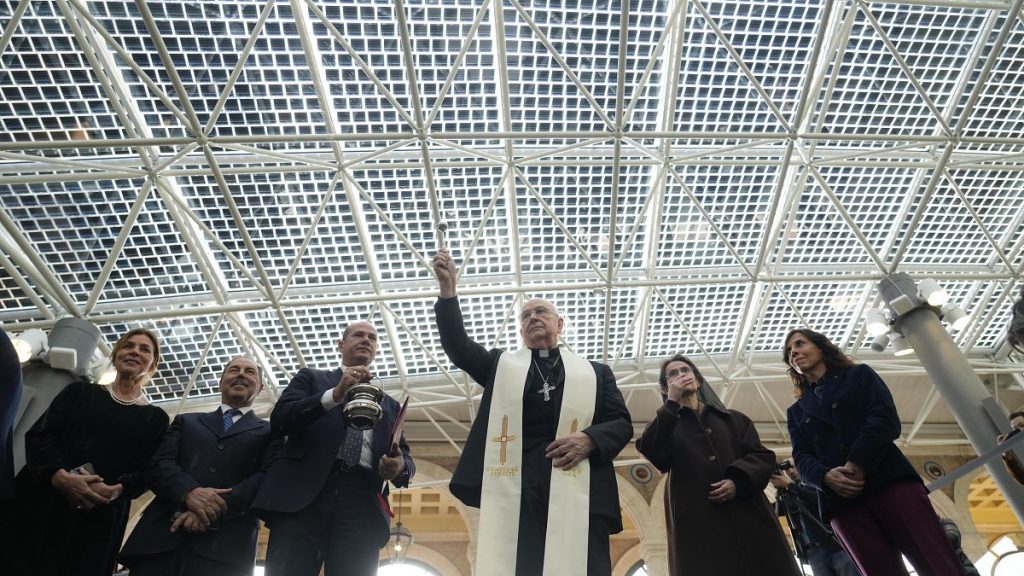Pope Francis, a staunch advocate for environmental sustainability, has embarked on a mission to transform Vatican City into a beacon of green energy. His vision, encapsulated in the “Brother Sun” letter released in June, outlines a comprehensive plan to transition the Vatican to 100% renewable energy. A key element of this plan involves the installation of solar panels on a Vatican-owned property outside of Rome, with the generated power projected to meet the entire energy demand of Vatican City. This ambitious initiative reflects the Pope’s deep commitment to addressing the climate crisis and promoting a more sustainable future for the planet. The recent inauguration of a new solar panel roof at the Vatican Museums marks a significant step towards realizing this vision.
The installation of the photovoltaic roof at the Vatican Museums, completed in a remarkably short span of six months by the Italian energy supplier ACEA, serves as a tangible demonstration of the Pope’s commitment. Integrating renewable energy infrastructure into existing, historically significant structures presents unique challenges. The successful implementation of this project showcases the feasibility of incorporating sustainable technologies into complex architectural settings, offering a valuable example for other institutions and cities worldwide. This initiative highlights the potential for blending modern innovation with historical preservation, demonstrating that environmental responsibility need not compromise cultural heritage.
Pope Francis’s dedication to environmental stewardship stems from a profound understanding of the interconnectedness of humanity and nature. In his “Brother Sun” letter, he emphasizes the urgency of transitioning to a sustainable development model that drastically reduces greenhouse gas emissions and strives for climate neutrality. He underscores the availability of technological solutions, such as solar energy, to address the multifaceted challenges posed by climate change. The Pope’s vision transcends mere technological implementation, highlighting the ethical, social, economic, and political dimensions of environmental transformation. He calls for a holistic approach to sustainability that considers the interconnectedness of these spheres.
The Pope’s environmental advocacy predates the “Brother Sun” letter. In his 2015 encyclical, “Laudato Si’,” he addressed the scientific consensus on climate change, highlighting the troubling warming trend, rising sea levels, and increasing frequency of extreme weather events. He called for a renewed dialogue on how humanity builds the future of the planet, emphasizing the interconnectedness of all creation and the moral imperative to protect the environment. This encyclical laid the groundwork for the Vatican’s subsequent actions and commitment to climate action.
The Vatican’s formal commitment to combating climate change was solidified in July 2022 when it joined the United Nations Framework Convention on Climate Change. This global agreement unites nations in addressing the dangers of human interference with the climate system. By joining this framework, the Vatican aligned itself with a global effort to mitigate climate change and demonstrated its commitment to international cooperation. This action further solidified the Vatican’s position as a leader in environmental stewardship and reinforced the Pope’s call for collective action.
The Vatican’s pursuit of 100% renewable energy aligns it with a select group of nations leading the charge in sustainable energy transition. This ambitious goal not only fulfills the Vatican’s international commitments but also sets an example for other nations and international organizations. By actively reporting on its progress at international climate conferences like COP29, the Vatican demonstrates its transparency and accountability. The Vatican’s commitment to achieving its 2030 targets serves as an inspiration and a testament to the feasibility of a sustainable future. This leadership role further underscores the Pope’s message that environmental responsibility is not merely a political or economic issue but a moral imperative for all of humanity.














